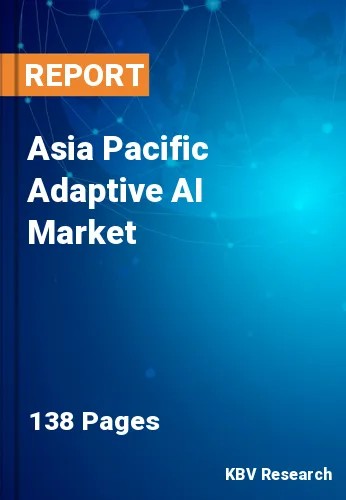The Asia Pacific Adaptive AI Market would witness market growth of 43.3% CAGR during the forecast period (2023-2030).
Real-time adaptive AI enables immediate adjustments and decision-making, which is crucial in scenarios such as autonomous vehicles, healthcare monitoring, and cybersecurity, where swift responses to changing conditions are essential. On the other hand, Offline Learning and Adaptation focuses on post-processing and long-term optimization, often seen in recommendation systems, content personalization, and predictive maintenance, where the AI system learns and fine-tunes itself over time based on historical data and user behaviour, providing continuous improvements and tailored experiences.
It reshapes the financial landscape by optimizing risk management, fraud detection, and investment strategies. These systems can analyze market trends, assess risk factors, and adapt to dynamic economic conditions. The ability to continuously learn and adjust in real-time gives financial institutions a competitive edge in navigating volatile industries. In Industry 4.0, this is instrumental in optimizing manufacturing processes, predictive maintenance, and supply chain management. By analyzing data from sensors and production lines, these systems can adapt to changing conditions, improving efficiency, and reducing downtime.
Many countries in the Asia Pacific region have formulated national AI strategies, providing a roadmap for developing and adopting AI technologies. Beijing, Tokyo, Seoul, Singapore, and Bangalore have emerged as innovation hubs, fostering technological advancements and research in adaptive AI. This is applied in healthcare for personalized treatment plans, diagnostics, and drug discovery. Countries like Japan and South Korea are leveraging AI for healthcare innovation. The factors mentioned above will propel the market growth in this region.
The China market dominated the Asia Pacific Adaptive AI Market by Country in 2022 and would continue to be a dominant market till 2030; thereby, achieving a market value of $916.6 million by 2030. The Japan market is registering a CAGR of 42.4% during (2023 - 2030). Additionally, The India market would showcase a CAGR of 44.2% during (2023 - 2030).
Based on Component, the market is segmented into Platform, and Services. Based on Application, the market is segmented into Offline Learning & Adaptation, Real-time, Context-aware Adaptation, Autonomous Decision-Making, and Others. Based on Technology, the market is segmented into Deep Learning, Computer Vision, Machine Learning, Natural Language Processing (NLP), and Others. Based on End-use, the market is segmented into BFSI, Healthcare & Life Sciences, Aerospace & Defense, IT & Telecommunications, Media & Entertainment, Retail & E-commerce, Manufacturing, and Others. Based on countries, the market is segmented into China, Japan, India, South Korea, Singapore, Malaysia, and Rest of Asia Pacific.
Free Valuable Insights: The Global Adaptive AI Market is Predict to reach $11.9 Billion by 2030, at a CAGR of 42.3%
The market research report covers the analysis of key stake holders of the market. Key companies profiled in the report include RisingMax Inc., Suffescom Solutions Inc., Markovate Inc., Cisco Systems, Inc., LeewayHertz, Cygnus Softwares, Inc., Ness Group of Companies, Softura, Tech Mahindra Limited, and Apexon.
By Component
By Application
By Technology
By End-use
By Country
Our team of dedicated experts can provide you with attractive expansion opportunities for your business.

